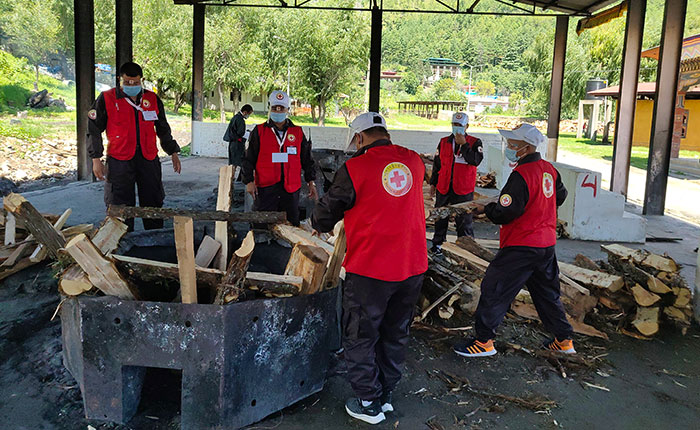Jigme Wangchuk
They are the undertakers, so to speak, the directors of the last honours. They are the managers and service providers both and much more. In these newfangled, difficult and unprecedented days, they are to many individuals and families the only friends and source of strength. It’s a hot day, Thursday, August 27. The place is crematorium at Hejo in Thimphu.
The expansiveness of the space suddenly unfolds under the vast blue sky and stretches on. And this is the picture: green army tents, not a single drunk swaying about, or the usual crowd of people and vehicles—utter silence. Here the departed are so honoured that the place inspires awe and deep reverence. Are they—the dead and gone and those they have left behind—the fortunate ones?
Five Red Cross volunteers are preparing the pyres. It’s not a good day today (going by Bhutanese astrology) to cremate body but the team of volunteers must always be prepared. It’s neither too early, nor too late. Last night they had a meeting—all the 12 Red Cross volunteers attend the late-night meetings—and the five who have taken upon themselves to manage the bodies decided that nothing should go amiss, whatever the case.
At least six bodies come to the Hejo crematorium every day. But then, how during the lockdown? These five volunteers, led by Rinzin Chophel, the chairman of Bhutan Taxi Association and a Red Cross volunteer, bring the bodies to the crematorium. Where the team works is a small information centre. The set-up is frugal and bare and there is just one man coordinating the whole and the next day’s events.
And there are the women Red Cross volunteers too. As you enter the crematorium, they stop you at the entrance. There is no gate but two straight lines that lead you to the hand-washing stand. Your temperature gets checked and your personal details are registered.
Death is an expensive affair; many families can’t even afford wood for cremation. And there are other things that must accompany the complete ritual. But here the Red Cross has stocked up 12 truckloads of wood. The families of the dead do not have to pay. What is more? The women Red Cross volunteers ensure that physical distance is maintained during the ritual ceremonies.
As things happen
Days before the nationwide lockdown, the Red Cross volunteers got together. It was difficult getting every volunteer involved but it had to be done. They saw that a plan was necessary in case the pandemic situation in the country got serious and decided that they would deal with all deaths related to Covid-19. There were mock sessions galore with experts and health professionals. But then they realised that they could do more—managing the crematorium in the times of Covid-19 meant they must take the full charge. Minimising the transmission threat was by far more important. They could certainly do more, a lot more.
The volunteers broke into small groups and thusly forged on: five for body management; three women at the entrance; one to handle the base information management; and three to ensure physical distance.
As in Thimphu, such Red Cross groups also are in Gelephu, Phuentsholing, Mongar, Trongsa, Bumthang, Tsirang and Samdrupjongkhar.
“We get the bodies and call the relatives. We arrange everything for them here. Sometimes it is difficult—when emotions are involved—but that’s only to be expected. We have learnt to deal with them very professionally and compassionately,” says Rinzin Chophel. “There are religious beliefs and traditions and there is practical urgency to consider. People often misunderstand us but that is not important. What is important is that we must protect every body from the pandemic, not just ourselves and our families.”
Wednesday, August 26, was a heavy one for the volunteers. Eleven bodies had to be cremated and there was a bit of crowd even with strict movement restrictions. Today, there are only 10 cars inside the crematorium compound.
Gempo Dorji, a teacher of Yangchenphug Higher Secondary School, who has lost one of his in-laws, says this new arrangement is very sensible. “Crowding, lavish food and drinks as is traditional in such situations in our society is insulting to the dead—I beg to differ. Covid-19 will go away one day but I wish this system of dealing with the dead became the new normal. It is good for both dead and living.”
Such views and sentiments can meet with derision in a society that is steeped deeply in traditional beliefs. Gempo Dorji is well aware of this. “But for the sake of our country and safety of all, particularly at this time, why can’t we adjust a little bit?”
Rinzin Chophel gets a call from the management base. It is urgent, from the referral hospital. The body management team must prepare the seventh body of the day.
“There is no space for failure. We have done well so far and can do better. We are always ready to serve our country,” says Rinzin Chophel.
And, in a jiffy, the proud undertakers are gone.


